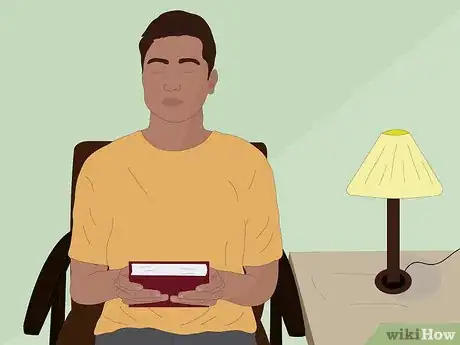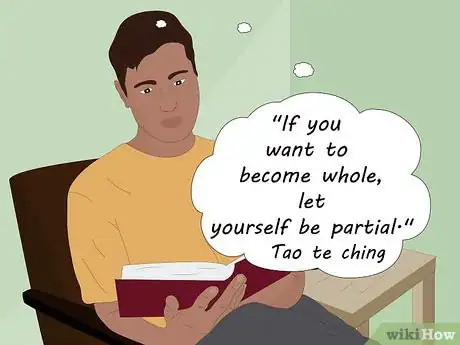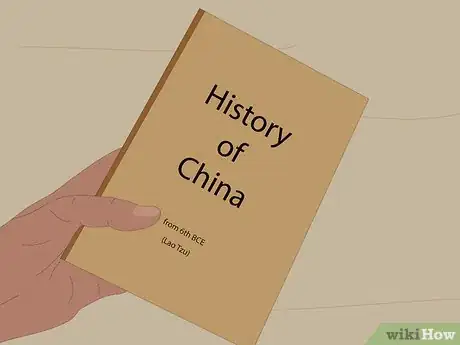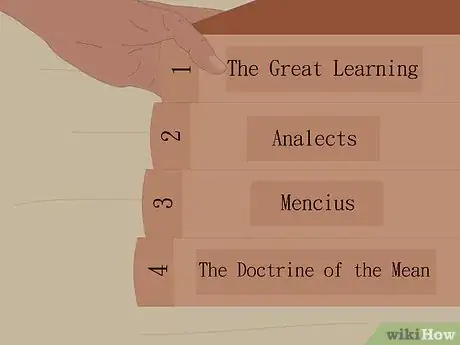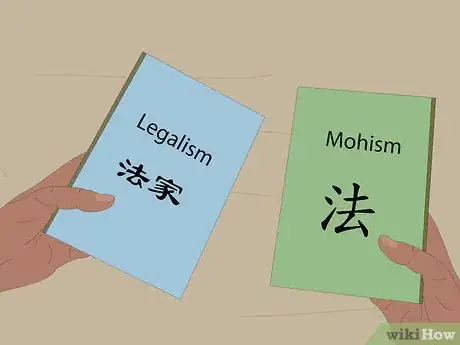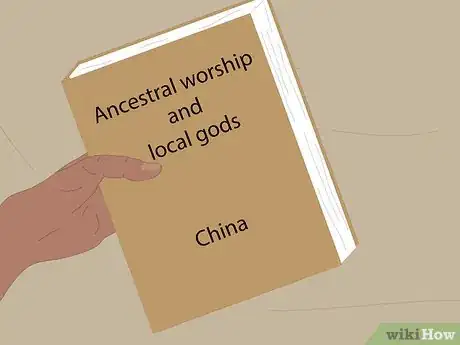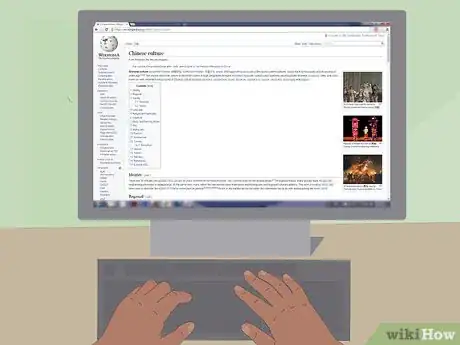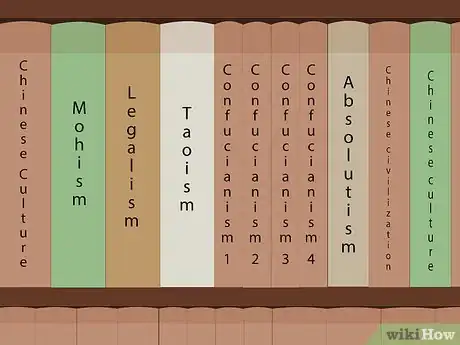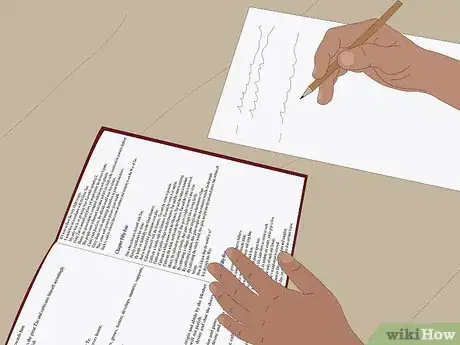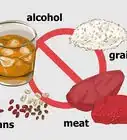wikiHow is a “wiki,” similar to Wikipedia, which means that many of our articles are co-written by multiple authors. To create this article, 22 people, some anonymous, worked to edit and improve it over time.
There are 7 references cited in this article, which can be found at the bottom of the page.
This article has been viewed 84,310 times.
Learn more...
The Tao Te Ching (Dao De Jing) is an ancient Chinese philosophical and moral text often attributed to Laozi (or Lao-tzu), "the old master." The verse can be difficult to understand, and many people have spent their entire lives dedicated to the study of the Tao Te Ching. While it can be hard to understand the text (especially depending on the translation), it’s certainly possible if you spend the time and energy. With a few pointers, you may be able to gain a basic understanding of one of the world's most difficult yet most captivating masterpieces. Here is how to begin!
Steps
Clear your mind
-
1Clear your mind of all thoughts while reading Tao te ching. Tao te ching is a timeless masterpiece which was written with a lucid state of consciousness. Its teachings are older than the world, how can you grasp them with your mind?
-
2Be completely present with your whole being. When you read Tao Te Ching, be aware of the stillness of your inner body, breathing and sense perceptions and let the true interpretation come from deep with in you. The more you research and interpret it via mind, the less you will understand.According to Tao Te ching "The Master gives himself up to whatever the moment brings. He knows that he is going to die, and he has nothing left to hold on to: no illusions in his mind, no resistances in his body. He doesn't think about his actions; they flow from the core of his being."
Research
-
1Start by researching China during the time of Lao-Tzu. Unfortunately, little is known about Lao-Tzu – even the years in which he lived are debated – but we do know he lived around the 6th to 4th centuries BCE.[1] At this time, China was torn apart by the six warring states. In your quest for understanding Lao-Tzu's times, research the six warring states and the effects this constant warring had on Chinese society. Many Chinese elders believed morals had fallen at this time, which may be a reason why the warring arose.
-
2Research Confucianism. Confucianism is a moral philosophy and religion that focuses on society as a whole, hierarchy, and obedience to superiors. Some people believe Taoism arose as a reaction to Confucianism. By understanding the reasons behind the ascent of Confucianism and the beliefs of Confucianism, you'll be in a good position to compare and contrast the elements of each.
-
3Research Legalism and Mohism. Both these Chinese philosophies arose at the time of Taoism. Each advocated philosophies opposed to Taoism. Research both of these philosophies in order to understand some of the hidden meanings in Taoism, which are often attacks on certain tenets of these philosophies, in similar vein to making a joke about Qin Shi Huang Di and not knowing who he is. (Qin Shi Huang Di was the first emperor who gave China its name and beat the other five family clans.)
-
4Research ancestral worship and local religions, particularly those in the region where Lao-Tzu lived in or traveled through. Ancestral worship was very important in China in this time and was seen as something forgotten by the people of the day. Lao-Tzu and the Tao Te Ching might have been influenced by ancestral worship and local gods and goddesses.
-
5Research Chinese culture. Taoism is completely against culture and civilization, instead believing people should cultivate a simple, ascetic lifestyle in tune with nature and the universe, which is naturally harmonious, perhaps working to a goal. To understand why the Tao Te Ching is anti-civilization, one must know what Chinese civilization was like at the time, particularly the immorality of certain sections like the elite, and worst of all, tax-collectors, who are definite signs of civilization.
-
6Build up a library's worth of books on: Taoism, Confucianism, Legalism, Mohism, Absolutism, Chinese civilization, Chinese culture, Ancestral worship and local gods, the six warring kingdoms and finally on Lao-Tzu himself. Make sure you have a variety of books on each topic, ensuring that you have access to well-rounded opinions and many different angles.
- It is best if the books are written by reputable people, such as professors of Chinese religions or renowned historians. However, make sure you buy books from both Chinese and foreign professors of these subjects, (for example, British or German professors), as doing so will give you both an insider's opinion and an outsider's.
- It is preferable that most of your books are not written by Chinese professors, only some, as the Chinese government have tried to suppress Taoism. Professors from China may be under pressure to write defamatory things on Taoism, which is often seen as too sexually liberal, even by Western standards.
-
7Learn from others who have been inspired by the Tao Te Ching. Many artists, poets, authors, calligraphers, and gardeners have been inspired by it.[2] Their interpretations might inform your own understanding.
-
8Spend time reading the Tao Te Ching. As you read it, make notes in a journal about your questions, thoughts, and impressions. Come back to your notes regularly to keep trying to work through your own ideas of the meanings in the text.
- Be aware that the style of the Tao Te Ching is poetic and the ideas are singular; the Tao Te Ching purposefully encourages contradictory interpretations through use of vague and ambiguous words.[3]
- Your interpretations and understandings of the Tao Te Ching may change over time. There is no one right way of interpreting it and no single reader can claim to have the upper hand in understanding its "real essence". Perhaps its ambiguity is its real beauty, allowing you to reassess yourself, through varying stages of life.
Warnings
- If you do not understand the Tao Te Ching, be humble about your lack of understanding and persevere with your reading and research. As Lao-Tzu said: "To realize that you do not understand is a virtue; not to realize that you do not understand is a defect."⧼thumbs_response⧽
Things You'll Need
- Research materials
- Library access or your own library of books
- Internet for research
- Tao Te Ching - read different versions as the translations vary
- Journal or notebook
References
- ↑ Wikipedia, Laozi, https://en.wikipedia.org/wiki/Lao_Tzu
- ↑ Wikipedia, Tao Te Ching, https://en.wikipedia.org/wiki/Tao_Te_Ching
- ↑ Wikipedia, Tao Te Ching, https://en.wikipedia.org/wiki/Tao_Te_Ching
- ↑ Wikipedia, Tao Te Ching, https://en.wikipedia.org/wiki/Tao_Te_Ching
- Online English translations of the Tao Te Ching:
- James Legge, http://www.sacred-texts.com/tao/taote.htm
- Frederic H. Balfour, http://www.sacred-texts.com/tao/ttx/ttx02.htm
- Aleister Crowley, http://www.sacred-texts.com/oto/lib157.htm
- Charles Muller, Daode Jing, http://www.acmuller.net/con-dao/daodejing.html
